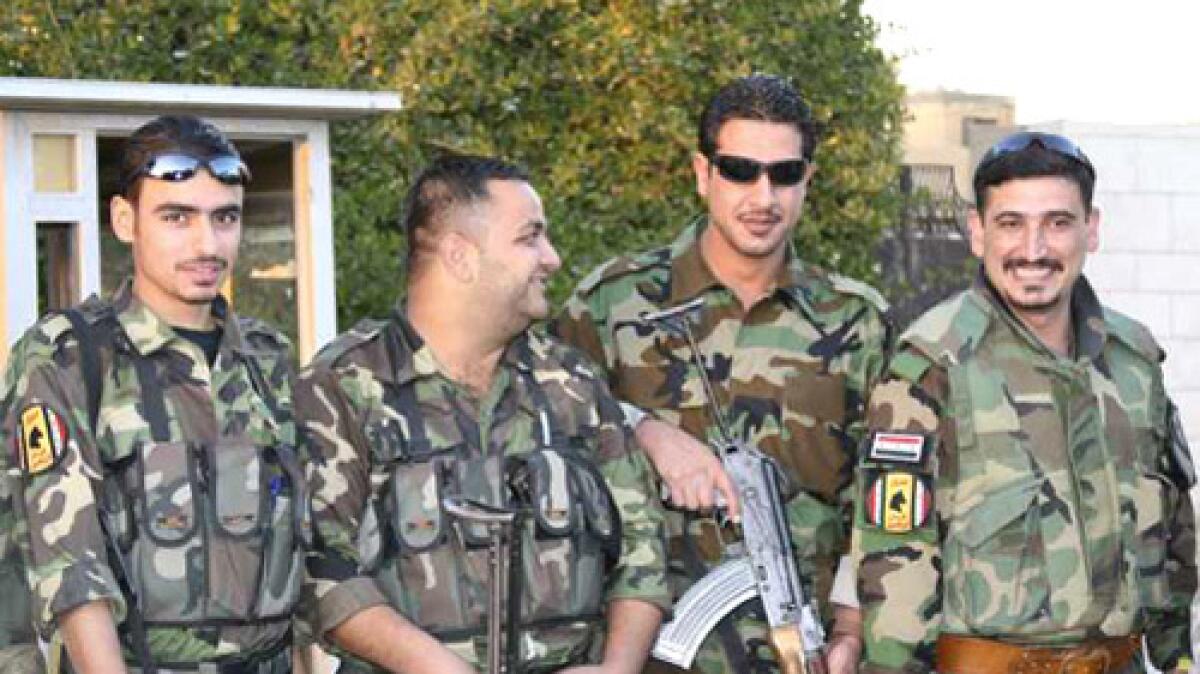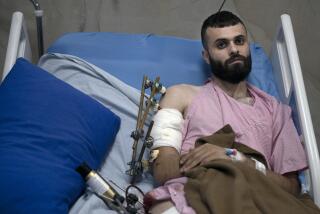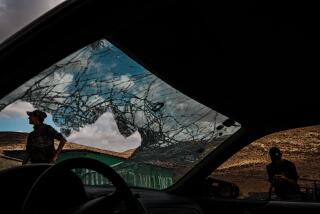Abu Abed: Ruthless, shadowy - and a U.S. ally in Iraq

BAGHDAD — “Abu Abed, you’re a hero,” the retired Shiite teacher shouted from the home she had fled last winter, when the bodies of Shiites were being dumped daily in the streets of her Amiriya neighborhood.
The fighter, wearing green camouflage and dark wraparound sunglasses, kept walking, his hand swinging a black MP-5 submachine gun.
No more than 5 feet 6, with a roll of baby fat, this Sunni Muslim gunman is an unlikely savior of Amiriya: a former intelligence officer in Saddam Hussein’s army, a suspected onetime insurgent, a man who has photos of his brothers’ mutilated corpses loaded in his cellphone.
To many Iraqis, Abu Abed is a Sunni warlord whose followers have spilled the blood of Shiite Muslim civilians and U.S. troops. But to the people in Amiriya, he is the man who has, with ruthless efficiency, restored order to a neighborhood where the insurgent group Al Qaeda in Iraq held sway.
With the nation’s politics deadlocked, the U.S. military has pinned its hopes for reconciliation in Iraq on the shoulders of such unknowable men. Abu Abed may have a shadowy past, and checkered present, but he has taken on extremists in his Sunni sect, and says he is willing to make peace with Iraq’s Shiite-led government.
One worry for the government is that paramilitary groups such as Abu Abed’s will seek to use their new relationships with the Americans to position themselves for another round of fighting with Iraq’s Shiite leadership when U.S. forces have withdrawn.
“The risks are that these guys go back into an insurgency, perhaps better organized and better motivated than they were in the past, and that’s what you want to avoid,” said a U.S. diplomat who has helped recruit Sunni tribes and insurgents to police neighborhoods, and who spoke on condition of anonymity.
Abu Abed’s pacification methods are merciless. Since he declared all-out war on the fighters who were terrorizing the neighborhood, he has killed members of Al Qaeda in Iraq, burned their hide-outs, plastered Amiriya’s walls with pictures of their corpses and broken his knuckles three times hitting disloyal members of his militia or prisoners.He claims his motivations are simple.
“I have a basic principle to fight anybody who is hurting my fellow citizens,” he said. “That’s why I cooperated in 2004 with the Americans and started to work against Al Qaeda.”
His 600-man paramilitary force, the Knights in the Land of the Two Rivers, is virtually the law in Amiriya, a district of marble-adorned villas and date palms where thousands of well-heeled Sunnis and Shiite professionals lived under Hussein. He has allowed a modicum of normality to return to the neighborhood’s streets, where shops now stay open until late in the evening and no bodies have been found since August.
At least 70 Shiite families have moved back to the area in the last three months under his protection. With the government absent, people go to him with their problems, sometimes personal ones. Men have asked him for advice on erectile dysfunction, and once a newlywed bride demanded that Abu Abed grant her a divorce after her husband failed to consummate their relationship.
American commanders have called on Iraq’s Shiite prime minister, Nouri Maliki, to seize upon the lull in violence to reconcile with Sunnis, many of whom had previously fought U.S. troops and the Iraqi government.
“They want to participate now, and the government has to allow them to do it,” said Maj. Barry Daniels of the Army’s 1st Battalion, 5th Cavalry Regiment, which is assigned to Amiriya. “I think if they feel they have a stake in their future, there is hope. If they do not, I am not very optimistic.”
Abu Abed wants to bring his men into the Iraqi security forces, even though he is deeply suspicious of the ruling Shiite parties. In 2005, his two brothers were detained in a late-night raid by the national police force, which has been infiltrated by Shiite militias. Their mutilated bodies were found three weeks later on the Iranian border.
In the pictures on his cellphone, one brother has a nail driven through his head, the other has a hand chopped off. Abu Abed has hard feelings and lingering suspicions about government officials, but says he has no choice but to deal with them.
“I have to take jobs with the government,” he said at his headquarters in a pink schoolhouse. “If I don’t, there will be more people kidnapped and killed.”
Abu Abed, who is in his late 30s, does not look like a former military intelligence officer except for his ramrod military posture. As he sits in his office, rap lyrics drift in from the courtyard, where his men are playing a recording of the song “P.I.M.P.” by 50 Cent: “We internationally known and locally respected, / And you know you’re just a P.I.M.P.”
As he drags on a Gauloise and flicks red worry beads in his hands, his seemingly permanent scowl and darting brown eyes reveal little. He is a man of secrets. Not even his own men really know him.
He has met with Maliki’s advisors, as well as Deputy Prime Minister Barham Salih and Vice President Tariq Hashimi, but Abu Abed complains that progress has been slow.
“What have we done wrong? Aren’t we fighting terrorists? Didn’t we bring back Shia families? We are with the law,” he said in his office, decorated with pictures of American generals.
The government has said it plans to absorb about 25% of the fighters from groups like Abu Abed’s into the security forces, but it is taking its time. This week, the government approved the hiring of the first 100 men from Abu Abed’s group to serve as the police force in Amiriya, but they must undergo a probationary period to prove their loyalty to the government.
“We know some Saddamists and Qaeda have tried to penetrate our security forces,” said Haidar Abadi, a parliament member and Maliki confidant. “We want to prevent them from infiltrating our forces.”
Abadi said he had spoken on the phone with Abu Abed and that his language sounded like an insurgent’s. “A lot of them, I think, are Islamic Army. Most of them were Iraqi Baathists. To me there is a change of heart, which is good,” he said, but he worried that many of the men who joined groups like Abu Abed’s were the same people who terrorized Shiites.
“We are bombarded by messages from people who returned to their areas. They say the people who slaughtered them are running the checkpoints,” he said.
At least $39 million has been spent equipping and paying for the paramilitary units across Iraq. The Americans expect these fighters to be absorbed into both the security forces and job-training programs.
It’s been three years since Abu Abed began a double life assembling a network of informers across Baghdad that he used to feed information to the U.S. military about Al Qaeda in Iraq. He helped hunt down insurgents and what he called Iranian operatives.
By June 2006, Amiriya residents had taken on a bunker mentality, deeply suspicious of the Americans and the Shiite-led government. Some informers had noticed Abu Abed’s comings and goings, and they spotted him leaving the Green Zone, the fortified area that includes Iraqi government offices and the U.S. Embassy. Soon after, someone riddled his taxi with bullets. He fled to Syria for a few months, and then reappeared in Amiriya.
After his return, he visited the mosques daily and made a public display of being with the hard-liners, but, he said, he began plotting to take down Al Qaeda in Iraq. He compiled files on its leaders.
“I tried to make some relations with Qaeda so they trusted me,” he said.
Early this year, he started sending indirect messages to the U.S. military that he was ready to launch his revolt.
The rebellion erupted May 30 when Abu Abed approached the local head of Al Qaeda in Iraq in the street. He told the man, Haji Sabah, also known as the “White Lion,” that the insurgent group was finished in Amiriya. Sabah’s pistol jammed and Abu Abed pumped 16 bullets into his back, and then took his black Glock as a trophy. Next, he drove to a restaurant where fighters with the group gathered each morning and opened fire on them.
The insurgents retaliated with heavy machine-gun fire, rocket-propelled grenades and mortars. He retreated to the Firdos mosque. His fighters had dwindled from 150 to just 15 as insurgents started to pour into Amiriya from across western Baghdad; he told his men to leave him, including his brother.
Abu Abed prepared to die. He was down to just four supporters, with three bodies in the mosque. Their enemies shelled the building with grenades. The mosque’s cleric said he had no choice but to call the Americans.
When the eight U.S. Army Stryker combat vehicles arrived, the tide turned.
U.S. troops and Abu Abed’s men started to hunt down their common enemy. Abu Abed wanted revenge: In June, he sent his men all over Baghdad to track down an Al Qaeda in Iraq fighter who had killed his friend.
Abu Abed defended his decision to hunt enemies outside Amiriya, an action that has been criticized by Iraqi government officials. “If I saw Osama bin Laden,” he said, “would I have to ask legal cover to kill him?”
The Americans defend him and his tactics.
“Did Abu Abed get heavy-handed with some guys? I’ll tell you this right now, Abu Abed personally killed some guys,” said Maj. Daniels, who has fought alongside him since June. “It’s a nasty business. It’s war and they fought against Al Qaeda and they decided to kill the guys who were killing their families and terrorizing their community.”
Abdul Razzaq Mohammed, a Shiite butcher, lived in Amiriya for 16 years before fleeing in September 2006 because Shiites were being killed. This fall, the 66-year-old decided to visit his old home when his friends assured him the neighborhood was safe. He met Abu Abed, who welcomed him back.
Mohammed visited for four days and then decided it was safe to return. He has no problem supporting the Sunni gunman: “I wish we had dozens of Abu Abeds in Iraq.”
--
ned.parker@latimes.com
More to Read
Sign up for Essential California
The most important California stories and recommendations in your inbox every morning.
You may occasionally receive promotional content from the Los Angeles Times.










